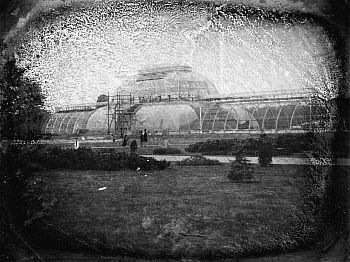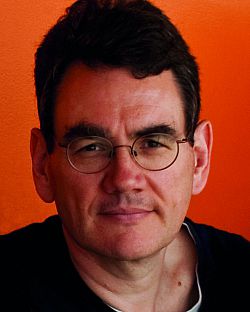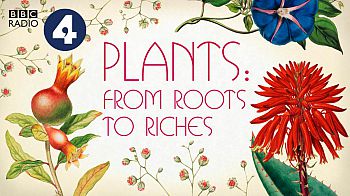Sussex historian digs up the facts for major BBC radio series on botany
A University of Sussex historian is the advisor on a major new BBC radio series this summer documenting the growth of Kew’s Royal Botanic Gardens.
 The oldest known photo of the Palm House at Kew
The oldest known photo of the Palm House at Kew
 Dr Jim Endersby
Dr Jim Endersby
 Dr Jim Endersby, Reader in the History of Science, is joining Kew’s science director Professor Kathy Willis in exploring 'Plants: From Roots to Riches', which starts on Radio 4 on Monday (21 July) and tells the story of how modern botany was born around the time of Kew’s establishment in 1759.
Dr Jim Endersby, Reader in the History of Science, is joining Kew’s science director Professor Kathy Willis in exploring 'Plants: From Roots to Riches', which starts on Radio 4 on Monday (21 July) and tells the story of how modern botany was born around the time of Kew’s establishment in 1759.
The 25-part series examines our changing relationship with plants by looking at Kew's archive and collections – including the herbarium of more than seven million preserved plant specimens. “The herbarium is a fascinating, echoey place, great for radio,” says Dr Endersby, who will feature throughout the series. “It contains plants from all over the world, including some collected in the Galapagos by Charles Darwin on the Beagle. And it’s also a living and working tool, with new specimens still arriving and needing special treatment and classification.”
Other collections that feature in the series include rare botanical books and Kew’s Economic Botany Collection, which contains Maori artworks and large blocks of raw opium.
Dr Endersby drew on his specialist knowledge of influential botanists including Joseph Hooker and of course Darwin to help shape the content of each 15-minute programme, which will be broadcast every weekday at 1.45pm.
The series goes right back to Carl Linnaeus and the birth of modern scientific classification, and comes right up to date with the story of Arabidopsis, the first plant to have its full genome sequenced, thus helping launch the controversial boom in genetically modified crops.
However, Dr Endersby was concerned that it should not simply be about famous men and major breakthroughs. Kew’s story is entangled with the story of the British Empire and with the broader cultural and social history of the past 250 years, so tribute is also paid to Beatrix Potter, an expert scientific illustrator who, after being thwarted in her attempt to join male-only science societies, turned her artistic hand to producing children’s literature.
The series will also look at how subsequent changes in scientific, economic and social preoccupations have influenced our attitudes to plants – from tools to exploit for food, fuel and industry, to objects of beauty, to being an essential global resource that must be conserved.
Dr Endersby says: “The series will appeal not just to gardening enthusiasts and historians, but to everyone who’s curious about our history and relationship with plants – how it began and where it’s all going.”
